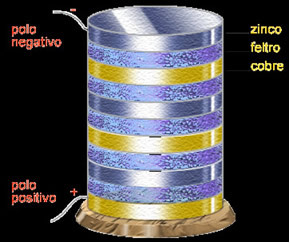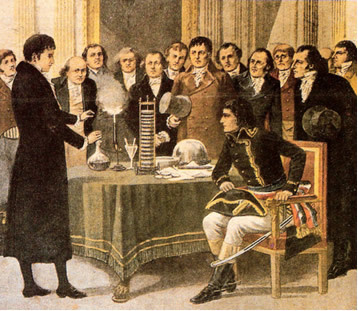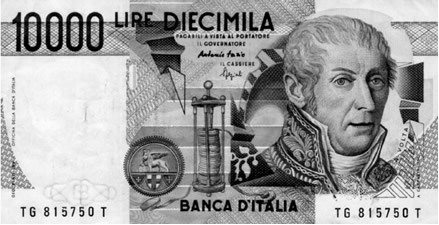Alessandro Giuseppe Antonio AnastasioVolta was born on February 18, 1745, in the small town of Como, near Milan, Italy.
He studied most of his life at the Jesuit College, but at age 16, he abandoned it to study on his own, only with the assistance of a canon. This canon and Volta's friend was Gattoni, who in addition to teaching him the basics of physics, also provided him with some necessary equipment for his experiments.
Although his uncle encouraged him to study law, he was determined to study physics. And, incredibly, Volta taught himself Physics, Mathematics, Latin, French, German and English.
Despite not having a diploma or not having defended a thesis, Alessandro Volta managed, with the help of the governor of Austrian Lombardy, Carlo di Firmian, a job as a teacher. Over time he went from substitute teacher to regent teacher. In addition, he also got the professorship of Experimental Physics in the schools of Como.
He became a very remarkable inventor. One of his first inventions was made in 1776, which was the eudiometer, a device that, through an electric spark, caused the reaction between two gaseous compounds. Volta used this device to confirm Proust's laws of definite proportions and those of gases, including the law of the expansion of gases subjected to heating, which was a law that he himself determined, together with Gay-Lussac.
That same year, Alessandro Volta isolated the methane gas, a discovery that increased his fame even more. that he was chosen to teach at the University of Pavia in 1779, of which he later became the Dean.
He also suggested the industrial production of vaccines, spread the use of asbestos in industry, spread the controlled cultivation of silkworms and rationalized the cultivation of hops and potatoes.
However, the invention that brought him the most credit was the electric cell, in 1800. He caused a huge stir in the scientific world when he stacked alternate disks of zinc and copper, separating them by pieces of tissue soaked in a solution of sulfuric acid. This device, which produced electrical current, whenever a conducting wire was connected to the zinc and copper discs at the ends, was called Back stack. From then on, all appliances that produced electricity through chemical processes came to be called by the following names: voltaic cells (in honor of Volta), galvanic batteries (in honor of Luigi Galvani (1737-1827)) or, simply, stacks.

In fact, the first to carry out experiments related to electric batteries was Galvani, but his interpretation of the results was wrong. Volta repeated Galvani's experiments and proposed an interpretation that proved to be accurate for the observed phenomena. And, to prove his hypothesis, Volta built the first electric cell, which was the one described above. For further insight into the origin and history of batteries, in addition to their controversies with Galvani, read the text “Battery history”.
Volta then became a celebrity and was even received in 1801 by Napoleon to demonstrate his famous discovery. He received from the emperor the appointment of senator and count of the kingdom of Italy.

An example of his popularity was the reproduction of an image of Volta and one of his piles in the center, in front of a 10,000 lire note issued by the Bank of Italy in 1984, as illustrated in follow:

Since he was not involved in political movements or controversies, Volta had a quiet life. In 1819, he moved to the town of Cammago, where he died at the age of 82 on March 5, 1827.
By Jennifer Fogaça
Graduated in Chemistry
Source: Brazil School - https://brasilescola.uol.com.br/quimica/alessandro-volta.htm

